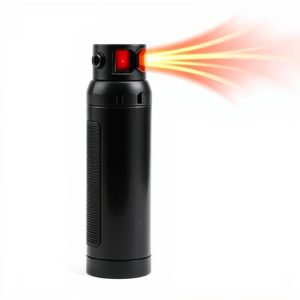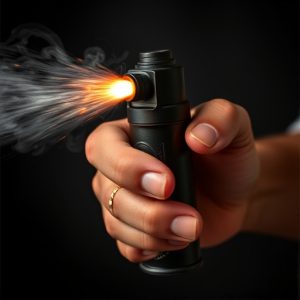Immediate Care for Pepper Spray: Symptoms, Treatments, and Legal Rights
In case of police-grade pepper spray exposure, swift action is crucial. Move to a safe, well-ventila…….
In case of police-grade pepper spray exposure, swift action is crucial. Move to a safe, well-ventilated area, remove contaminated clothing, and rinse eyes with water for 15 minutes. Over-the-counter antihistamines and decongestants can help with itching and nasal congestion. Severe reactions or persistent symptoms require medical attention. For home remedies, use cold compresses and mild natural cleansers. When handling pepper spray, follow manufacturer instructions, wear protective gear, store securely, and regularly inspect equipment. Immediate care minimizes discomfort, prevents damage, and ensures safety.
“Experience with police-grade inflammatory pepper spray can be traumatic, but understanding its composition and immediate care strategies is crucial. This article delves into the science behind these powerful compounds, focusing on their impact and symptoms. We explore essential first aid measures for immediate care, offering practical tips to alleviate discomfort. Additionally, we discuss legal considerations and rights related to pepper spray use, along with preventive practices for safe handling. Learn how to effectively manage exposure and protect yourself.”
- Understanding Pepper Spray Composition and Its Impact
- Immediate Steps After Exposure: Symptoms and First Aid
- Effective Treatments and Home Remedies for Pepper Spray Irritation
- Legal Considerations and Rights When Using Pepper Spray
- Preventive Measures and Safe Handling Practices
Understanding Pepper Spray Composition and Its Impact
Pepper spray, a common less-lethal weapon used by law enforcement, is composed of capsaicin, the active ingredient derived from chili peppers. This compound stimulates nerve endings, causing intense pain, temporary blindness, and difficulty breathing. The impact can vary depending on factors like concentration, delivery method, and individual sensitivity, but immediate care is crucial following exposure to ensure minimal discomfort and potential adverse effects.
Understanding the composition of pepper spray helps in knowing how to respond effectively. Immediate care involves rinsing the affected area with water for at least 15 minutes, seeking fresh air if outdoors, and removing any contaminated clothing or jewelry. Medical attention should be sought if symptoms persist or worsen, as capsaicin can cause skin irritation, respiratory distress, or other serious reactions in sensitive individuals.
Immediate Steps After Exposure: Symptoms and First Aid
If someone is exposed to police-grade inflammatory pepper spray, immediate action is crucial for mitigating discomfort and potential damage. The first step is to move the affected individual to a safe, well-ventilated area away from direct sunlight or heat sources. Removing any contaminated clothing promptly is essential, taking special care around eyes, mouth, and nose to prevent further irritation. Rinsing the eyes with clean water for at least 15 minutes is recommended, ensuring the water flows over both eyelids and under the eyebrows.
For first aid, applying a cold compress or ice pack wrapped in a towel can help reduce swelling and pain. Over-the-counter antihistamines may provide some relief from itching, while decongestants could ease nasal congestion. It’s vital to monitor breathing; if breathing is difficult, seek medical attention immediately. Staying hydrated and getting plenty of rest after exposure aids in recovery.
Effective Treatments and Home Remedies for Pepper Spray Irritation
In the event of accidental exposure or attack with pepper spray, immediate care is crucial to mitigate discomfort and potential damage. The first step should be to remove any contaminated clothing, ensuring not to rub the eyes or skin as it can spread the irritant further. Rinse the affected areas thoroughly with cool water for at least 15 minutes, allowing the water to flush out as much of the spray compound as possible.
For severe cases, seeking medical attention is advised. A healthcare professional might recommend topical creams or antihistamines to soothe the skin and eyes. Home remedies like applying a cold compress or using mild, natural cleansers can also provide relief. It’s essential to remember that immediate care is key in managing the effects of pepper spray irritation, so act swiftly if exposed.
Legal Considerations and Rights When Using Pepper Spray
When police utilize pepper spray, they must navigate a complex web of legal considerations and respect individual rights. The use of force, including chemical agents like pepper spray, is subject to strict protocols and guidelines designed to protect citizens’ liberties while ensuring officer safety. These rules vary by jurisdiction but generally mandate that officers employ such force only as a last resort when necessary for self-defense or to prevent serious harm.
Immediate care for those affected by pepper spray is crucial. Those hit with the compound may experience severe discomfort, coughing, difficulty breathing, and even temporary blindness. It’s essential for police to ensure prompt medical attention for any injured parties, regardless of their involvement in the incident. Additionally, officers must document the use of pepper spray, including the circumstances, to maintain transparency and accountability, ensuring due process rights are upheld throughout the entire process.
Preventive Measures and Safe Handling Practices
In the event of exposure to pepper spray, immediate care is crucial. If affected, step into a well-ventilated area or outdoor space to prevent inhalation. Remove any contaminated clothing and wash eyes with clean water for at least 15 minutes, ensuring thorough irrigation. Seek medical attention if symptoms persist or severe reactions occur.
Safe handling practices are essential when dealing with pepper spray compounds. Always follow manufacturer instructions and use protective gear, including gloves, eye protection, and respirators, during application or disposal. Ensure proper storage in secure containers, out of reach of children and unauthorized individuals, in cool, dry places to maintain potency and prevent degradation. Regularly inspect equipment for any damage or leakage, promptly replacing faulty items.
Understanding the composition of pepper spray and its immediate impact is crucial for both victims and those who carry it for self-defense. Knowing how to provide prompt immediate care for pepper spray exposure, including recognizing symptoms and administering first aid, can significantly reduce discomfort and potential long-term effects. Additionally, being aware of legal considerations and rights ensures responsible usage. Implementing preventive measures and safe handling practices is essential to minimize the risk of accidental exposure and maximize the effectiveness of pepper spray as a deterrent.


